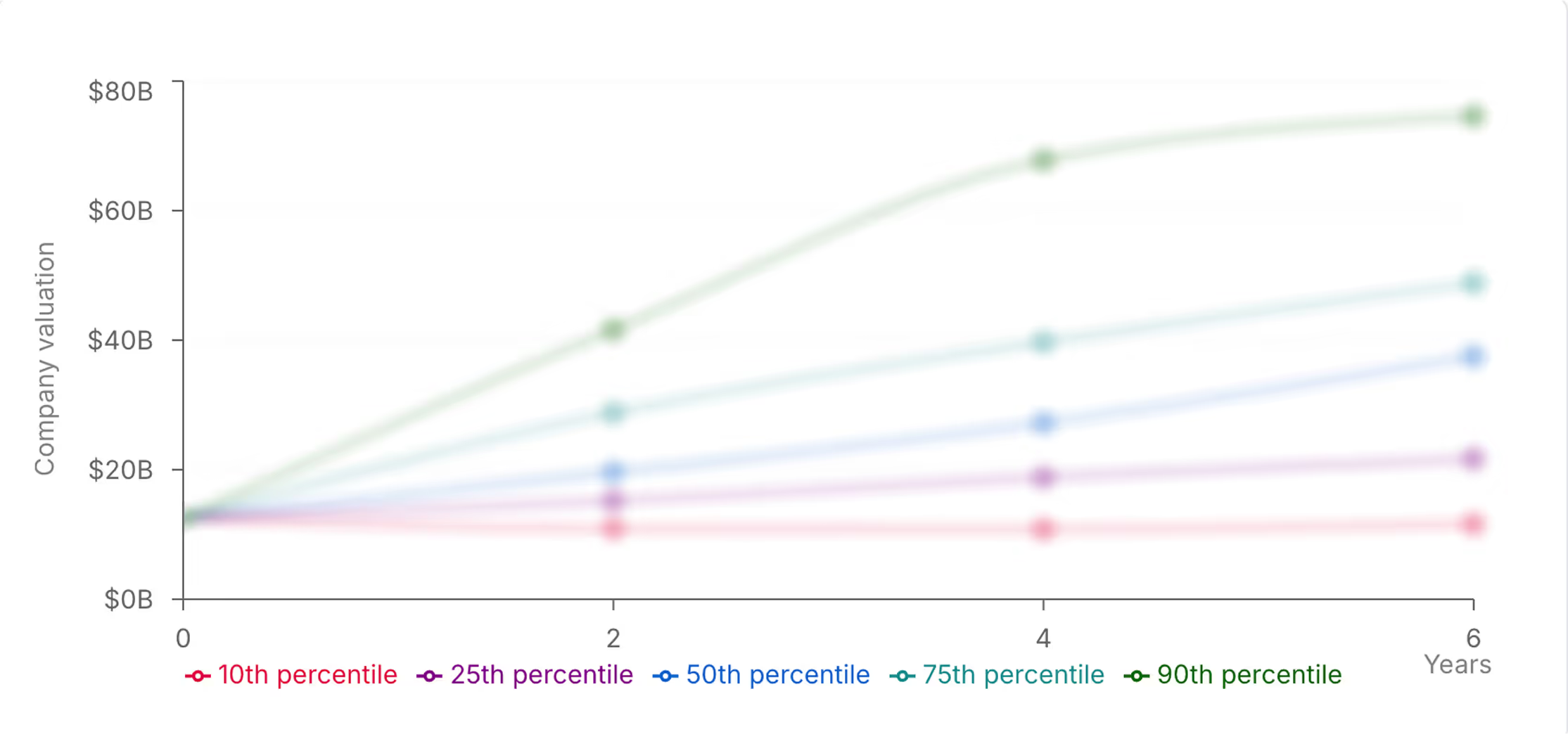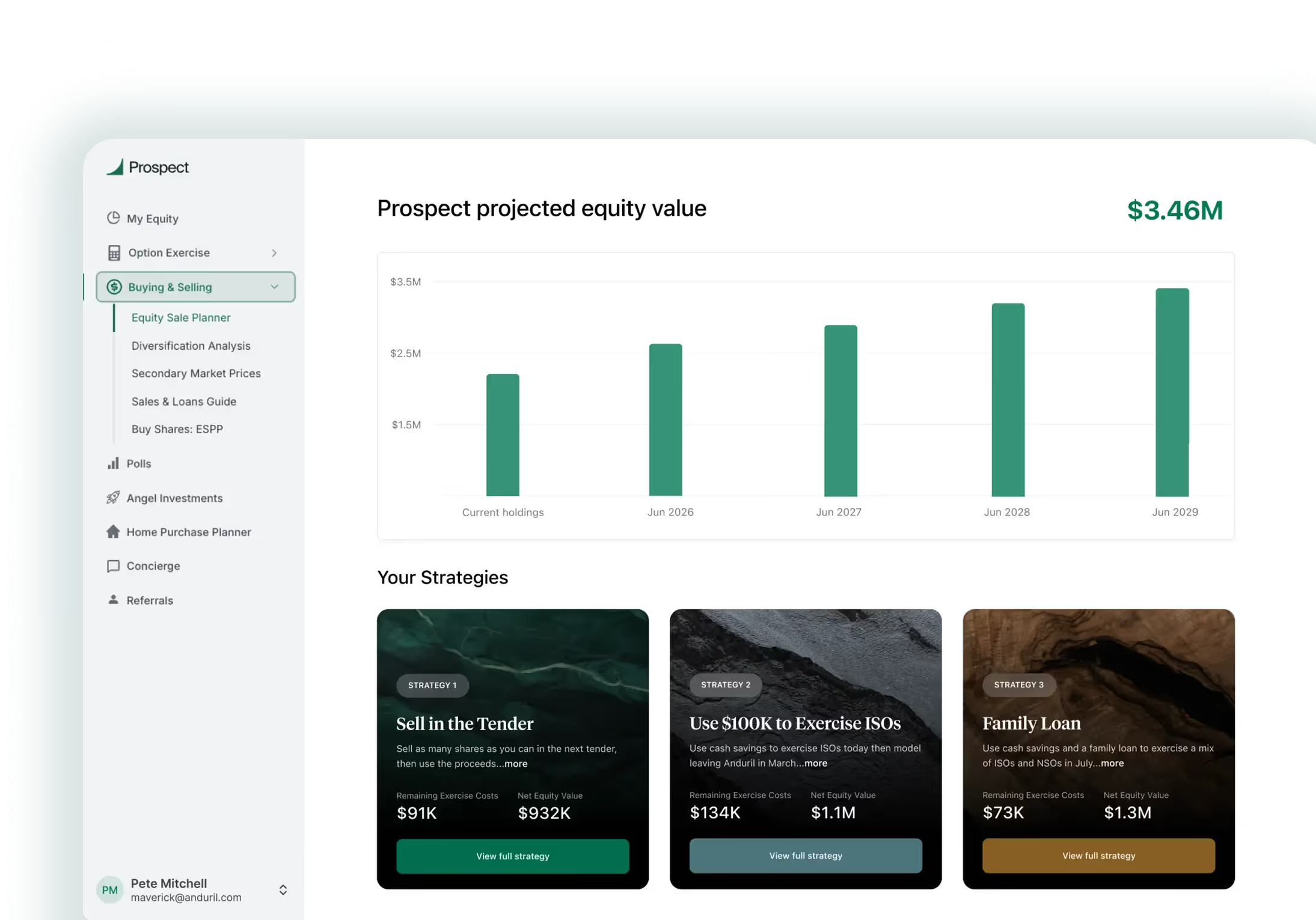
Headway
Headway's platform, the largest US mental health network, helps patients find therapists who accept insurance, powering 600,000+ monthly appointments.
Secondary Market Price
How Headway Measure's Up
To help you manage your Headway equity, Prospect has run the company through our machine learning model.
Prospect Rating
2X
Our analysis suggests Headway has the potential to be worth at least 2X its current value in four years. In other words, our 2X rating suggests the potential for your employee stock to double in value.
Exit Risk
Low Risk
Our Low Risk rating for Headway is due to its backing by top investors, its ability to scale quickly, and its successful fundraising since the market downturn.
Funding Stage
Series D
Since Headway is at the Series D stage, it's a more mature company that has already proven its business model. This generally means more stability and structure for employees than you'd find at a much younger startup.
Secondary Market Price Chart
Secondary market prices shown here are a limited preview. Create a free account to access real-time secondary market prices.
Sign up to Unlock the Latest DataData will be available soon.
Sign up to receive notifications when it is available.

Prospect Projected Future Headway Prices
Prospect’s machine learning model has been trained on the same data top-tier investors use to project the likely range of outcomes for Headway's equity. Create a free account to view 10th-90th percentile projections over 2, 4, and 6 years.

Powerful tools to earn more from your equity

Company Description
Headway is a mental healthcare technology company that operates a software platform to connect patients, therapists, and insurance companies. The platform is designed to make mental healthcare more accessible and affordable by simplifying the process of finding in-network providers and managing appointments, billing, and claims. Currently, Headway supports a network of over 60,000 providers and facilitates more than 600,000 appointments each month. The company was founded in 2017 by Andrew Adams and Jake Sussman, who were inspired by their own difficulties finding therapists who accepted their insurance in New York City. They built the platform to address this gap, enabling providers to easily accept insurance and grow their practices while helping patients find affordable care.
Looking forward, Headway is focused on scaling its platform to improve therapy access and affordability nationwide. The company has raised over $325 million from investors like Andreessen Horowitz and GV, achieving a valuation of $2.3 billion. Recent developments signal its commitment to growth and quality, including the appointment of Dr. Neha Chaudhary as its new Chief Medical Officer to advance research and care standards. Headway also recently expanded its insurance-native EHR platform with new features like AI-assisted notes and integrated telehealth. This momentum was recognized when Fortune named Headway one of the Best Workplaces in Healthcare for 2025.
- Founders Fund
- Bain
- Felicis
- Valor
- Coinbase Ventures
- Lowercarbon Capital
- Polychain Capital
- EXOR
- Upper 90
- Zigg Capital
- Winklevoss Capital
- G2VP
- DRW
- Co-Founder, CEO Andrew Adams
- Co-Founder, Daniel Ross
- Co-Founder, Kevin Chan
- Co-Founder, Jake Sussman
Frequently Asked Questions
Joining Anduril as an employee is another way to acquire equity, typically through stock options included in compensation packages.
Is Headway worth joining?
Headway shows significant promise with strong investor backing and rapid growth, but it also faces considerable risks from competition and high customer acquisition costs. To make an informed decision, you can use a platform like Prospect to analyze the company's potential and evaluate what your equity could be worth.
What should I do with my Headway stock?
As a private company, your options for Headway stock are typically to hold it or explore selling on a secondary market, if available and permitted. Tools from Prospect can help you manage your equity by providing tax optimization strategies, scenario modeling, and diversification analysis to maximize its value.
Can you sell Headway stock?
Selling stock in a private company like Headway is often possible through secondary markets, but it is subject to company restrictions and transfer policies. Platforms like Prospect can provide data on secondary market prices and tax-optimal selling strategies to guide your decision.
How can I find the value of my Headway stock?
A company's 409A valuation is the official price for tax purposes, but the fair market value can be different and is often determined by recent funding rounds or secondary market transactions. You can use Prospect's tools to get a more detailed projection of your equity's potential worth based on market data and company performance.
What is Headway's equity worth?
Headway's most recent valuation is reported at $2.3 billion, which provides a high-level indicator of the company's overall worth. The specific value of your equity depends on the number of shares you own, and you can use a platform like Prospect to project what your stake might be worth in various scenarios.
What is Headway's stock ticker symbol?
Headway is a private company and does not have a stock ticker symbol, as these are reserved for companies traded on public stock exchanges. If Headway were to go public through an IPO in the future, it would then be assigned a ticker.
Can I buy or sell Headway stock?
As a private company, buying Headway stock is typically limited to accredited investors during funding rounds or on secondary markets, while selling is subject to company policies and right of first refusal (ROFR). Platforms like Prospect offer tools and data to help you navigate the complexities of selling private company shares.
What is the criteria to buy or invest in Headway stock?
Investing in a private company like Headway is generally restricted to accredited investors who meet specific income or net worth thresholds defined by financial regulators. These opportunities typically arise during organized funding rounds or through specialized secondary market platforms.


